
싱크탱크세계평의회(Council of Councils) 제11차 서울 지역회의
| 2018-10-07
[다운로드] 회의록: "북한 비핵화"
[다운로드] 회의록: "경합하는 아시아 지역질서"
[다운로드] 회의록: "기술민족주의"
[다운로드] 회의록: "에너지와 환경질서"
[다운로드] 회의록: "보건안보"
[영상보기] 하영선-Richard Haass 특별 대담
오늘날 세계화로 인한 국가 간의 상호의존성 심화와 불균등 경제발전, 신흥 대국의 등장, 민족주의의 부상, 국내정치 변화 등 다양한 도전에 대해 논의하는 자리를 마련하고자 EAI는 미국외교협회와 공동으로 10월 7-9일 싱크탱크세계평의회 제11차 지역회의를 서울에서 개최하였습니다. “Adapting to a Changing Order in Asia”라는 주제 하에 본 지역회의에서는 북핵 문제 및 아태 지역질서, 보건안보, 기술 민족주의(techno-nationalism)와 4차 산업혁명, 에너지와 환경 질서 등 한반도를 비롯해 국제사회가 직면한 여러 지역·국제 문제를 다뤘습니다.
싱크탱크세계평의회(Council of Councils: CoC)는 2012년 3월 미국외교협회(Council on Foreign Relations: CFR)가 현재 국제사회가 직면하고 있는 복합적인 도전들을 진단하고 이에 대한 정책적 해법을 찾고자 국제적으로 권위 있는 외교안보 정책연구기관들과 함께 조직한 국제 네트워크입니다. 현재 25개 국가에서 29개 정책연구기관이 참여하고 있으며, 매년 정기적으로 열리는 연례회의 및 지역회의를 통해 주요 국제 이슈 및 지역 차원의 문제를 논의하고 정책적 대안을 공유하고 있습니다. CoC는 주요 20개국(G20)의 싱크탱크가 중심축을 이루고 있으며, 글로벌 수준의 연구와 정책적 역량을 갖춘 기관들로 구성되어 있습니다.
동아시아연구원(East Asia Institute: EAI)은 한국을 대표하는 유일한 CoC 창립멤버로서 CoC를 통해 세계 최고 수준의 싱크탱크들과 함께 21세기 인류가 직면한 복합적인 도전에 대응하기 위한 공감대 형성(consensus building) 및 진솔한 소통(candid dialogue) 과정에 적극적으로 참가하고 있습니다. 특히 한국을 대표하는 기관으로, EAI는 한반도의 주요 안보 현안 및 국제협력 의제에 대해 의견을 개진하고, 한반도 이슈에 대한 국제사회의 주의를 지속적으로 환기시키고 있습니다.
프로그램
Sunday, October 7, 2018
| 6:30 p.m.–9:00 p.m. | Opening Reception, Dinner, and Discussion A Conversation With Cho Hyun Hosted by the Council on Foreign Relations Welcoming and Opening Remarks: Yul Sohn, President, East Asia Institute (South Korea) Richard N. Haass, President, Council on Foreign Relations (United States) Keynote Speaker: Cho Hyun, First Vice Minister of Foreign Affairs (South Korea) Moderator: Richard N. Haass, President, Council on Foreign Relations (United States) |
Monday, October 8, 2018
| 8:30 a.m.–9:00 a.m. | Registration and Coffee |
| 9:00 a.m.–10:30 a.m. | Session One Denuclearizing North Korea Guiding Questions: How should we define the denuclearization of North Korea? What is the likelihood of achieving this goal, and what are the most formidable challenges to doing so? How can those challenges be overcome? How should we assess Kim Jong-un’s underlying strategic calculations and his pursuit of diplomacy? What are the achievements and shortfalls of President Donald J. Trump and President Moon Jae-in’s diplomacy with regard to the future of the Korean Peninsula, and what should be their next steps? What are China’s interests, and what role is China likely to play as negotiations continue? How will Northeast Asian regional architecture change, assuming the denuclearization and normalization of North Korea is successful? Panelists: Chaesung Chun, Chair of the Center for International Relations Studies, East Asia Institute; and Professor, Seoul National University (South Korea) Ettore Greco, Executive Vice President, Institute of International Affairs (Italy) Guan Guihai, Executive Vice President, Institute of International and Strategic Studies (China) Osamu Onoda, Visiting Senior Fellow, Genron NPO (Japan) Moderator: Young-Sun Ha, Chairman, East Asia Institute (South Korea) |
| 10:30 a.m.–10:45 a.m | Coffee Break |
| 10:45 a.m.–12:15 p.m | Session Two Addressing Global Health Challenges in an Aging World Guiding Questions: Which of the multitude of challenges that accompany an aging world are dependent on international cooperation to solve, and what is the role of global and regional governance in confronting them? What principles should govern private sector engagement in confronting the challenges of aging, and are there areas where the private sector should not be brought in? How can nations work together to mitigate exposure to rising health threats from multinational companies and global supply chains, such as tobacco, pollution, and unhealthy foods? How can countries cooperate to shift more research, development, and delivery of medicines from infectious disease challenges to chronic diseases? How can international institutions ensure trade agreements promote rather than restrict access to affordable medicines and assistive technologies? How can global and regional governance architectures better engage the private sector in driving the heath-care response and reduce the financial risks of aging? Panelists: Thomas Bollyky, Senior Fellow for Global Health, Economics, and Development, and Director of the Global Health Program, Council on Foreign Relations (United States) Eduardo Mello, Assistant Professor, Getulio Vargas Foundation (Brazil) Carlos Javier Regazzoni, Consultant Member, Argentine Council for International Relations (Argentina) Moderator: Barbara Lippert, Director of Research and Member of the Executive Board, German Institute for International and Security Affairs (Germany) |
| 12:15 p.m.–1:45 p.m. | Working Lunch on Common Challenges Think Tanks Face Presider: Stewart Patrick, James H. Binger Senior Fellow in Global Governance and Director of the International Institutions and Global Governance Program, Council on Foreign Relations (United States) |
| 1:45 p.m.–2:45 p.m. | Session Three Global Governance Working Papers Discussion: Arctic Governance and Climate Finance Panelists: Samir Saran, President, Observer Research Foundation (India) Zhao Long, Assistant Director of the Institute for Global Governance Studies and Associate Professor, Shanghai Institutes for International Studies (China) Moderator: Steven Blockmans, Senior Research Fellow and Head of EU Foreign Policy, Centre for European Policy Studies (Belgium) |
| 2:45 p.m.–3:00 p.m. | Coffee Break |
| 3:00 p.m.–4:45 p.m | Public Session The Future of Asia’s Contested Order Guiding Questions: What is the current state of Asia’s regional architecture, and what are the chances of a regional security architecture emerging? How can existing regional and multilateral institutions and forums decrease regional tensions? How does China fit in the regional architecture? Are countries in the region beginning to reevaluate their assessment of China’s intentions and what China’s rise means for them? How should we assess Xi Jinping’s foreign policy initiatives, principally the community of common destiny and Belt and Road Initiative? What does the Trump administration’s desired regional architecture for the Indo-Pacific look like, and how divergent is it from the interests of other powers in the region? How can regional middle powers hedge against increasing tensions in the region? What policies can other major Asian powers pursue against this backdrop? Panelists: Richard N. Haass, President, Council on Foreign Relations (United States) Michael Fullilove, Executive Director, Lowy Institute (Australia) Ma Sang-yoon, Director-General for Strategy, Ministry of Foreign Affairs (South Korea) Wu Chunsi, Director of the Institute for International Strategic Studies, Shanghai Institutes for International Studies (China) Moderator: Thierry de Montbrial, Executive Chairman, French Institute of International Relations (France) Keynote Remarks: Lee Hong-koo, Former Prime Minister of the Republic of Korea and Founding Chairman of the East Asia Institute (South Korea) |
| 4:45 p.m.–7:00 p.m | Free Time |
| 7:00 p.m.–9:30 p.m | Reception, Dinner, and Discussion Changes in the Global Trade Order and Challenges to South Korea Keynote Speaker: Seokyoung Choi, Senior Advisor at Lee&Ko; Former Ambassador and Permanent Representative to the UN and WTO to Geneva; Former Deputy Minister for Trade (South Korea) Moderator: Yul Sohn, President, East Asia Institute (South Korea) |
Tuesday, October 9, 2018
| 8:30 a.m.–9:00 a.m | Registration and Coffee |
| 9:00 a.m.–10:30 a.m |
Session Four
Gilead Sher, Senior Researcher and Director of the Center for Applied Negotiations, Institute for National Security Studies (Israel) |
| 10:30 a.m.–10:45 a.m | Coffee Break |
| 10:45 a.m.–12:15 p.m |
Session Five
|
| 12:15 p.m.–12:45 p.m. | Closing Remarks and Wrap-Up Speakers: Yul Sohn, President, East Asia Institute (South Korea) Richard N. Haass, President, Council on Foreign Relations (United States) |
| 12:45 p.m.–2:15 p.m | Lunch and Departure of Participants |
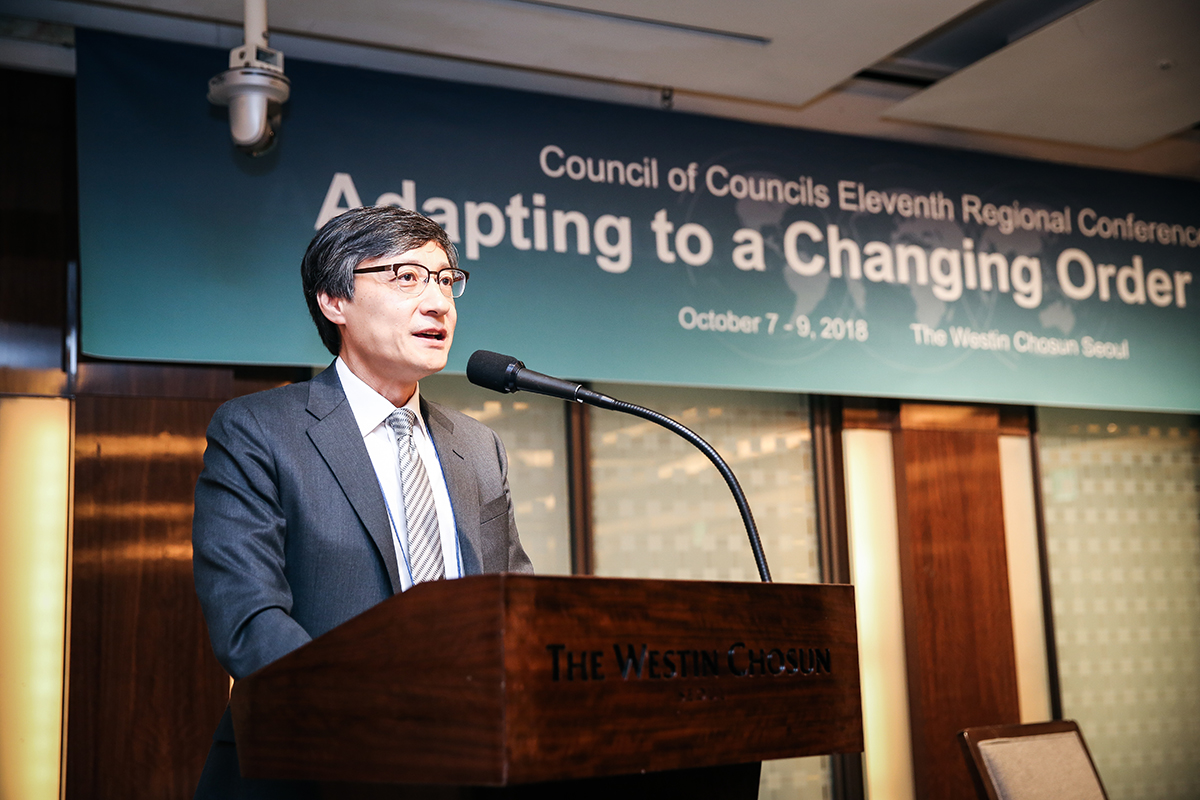
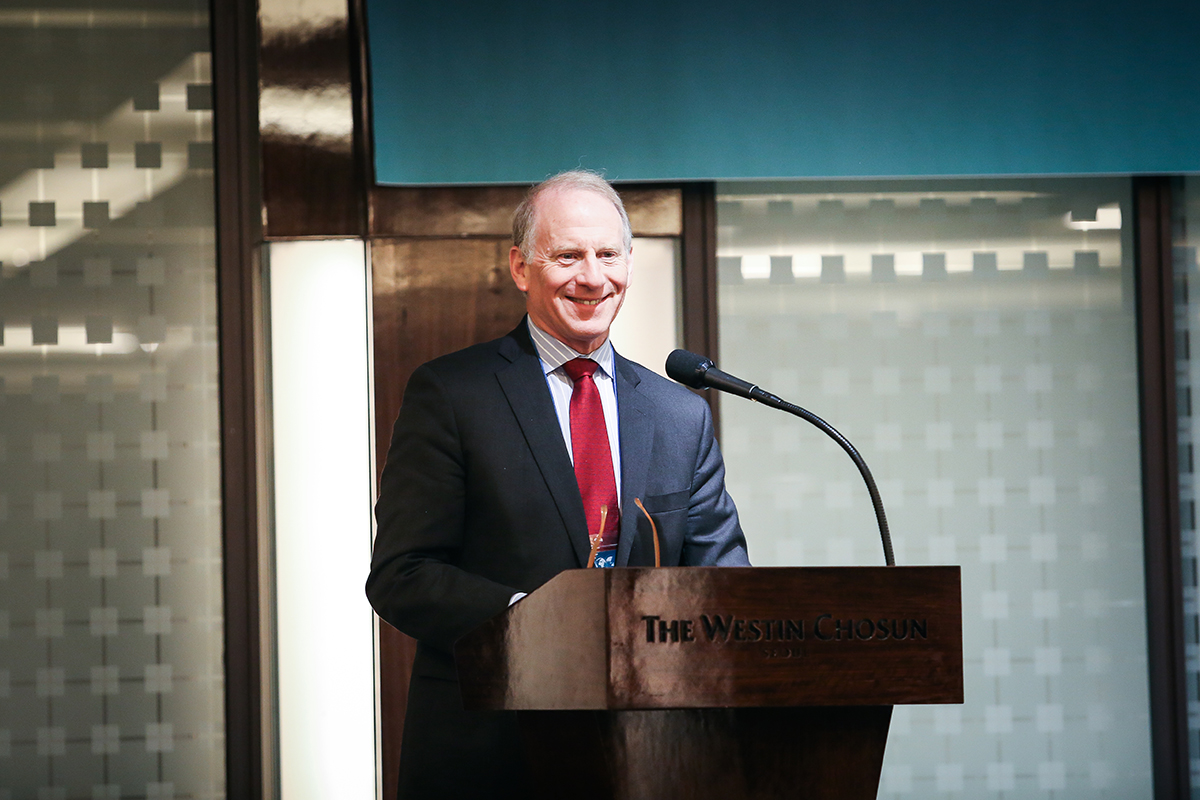
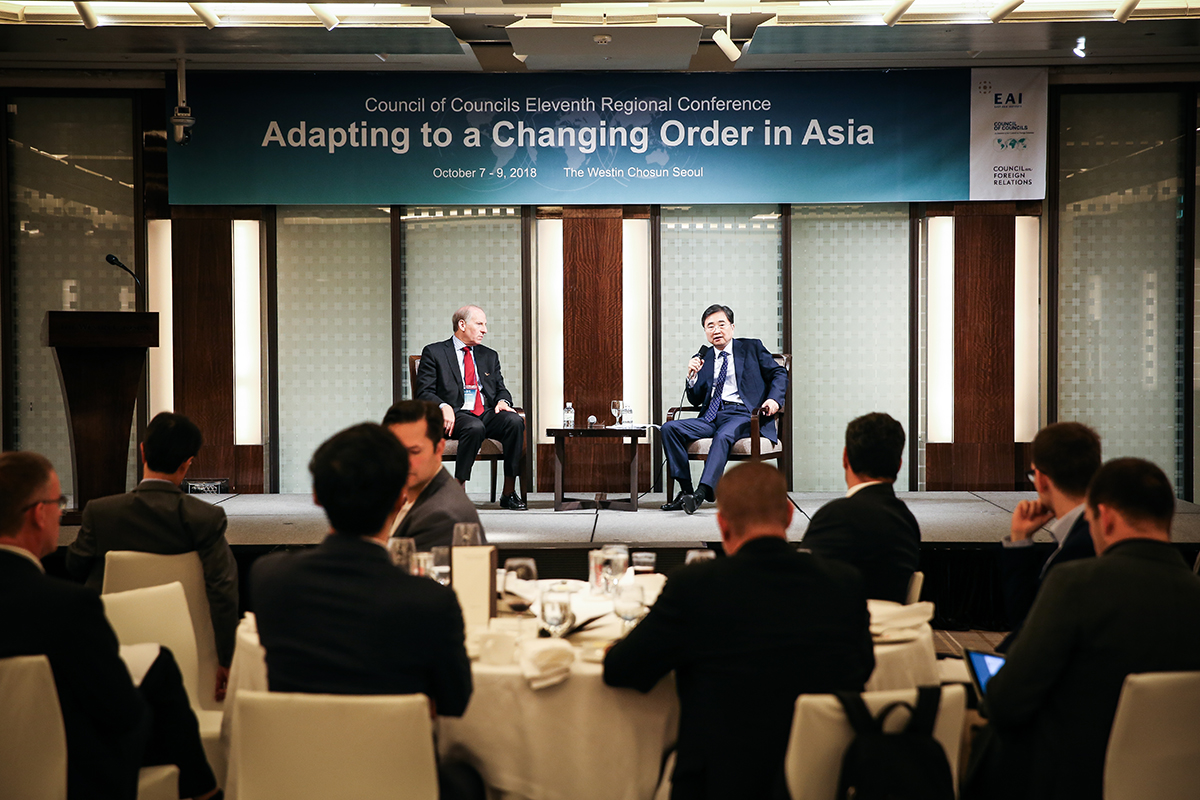
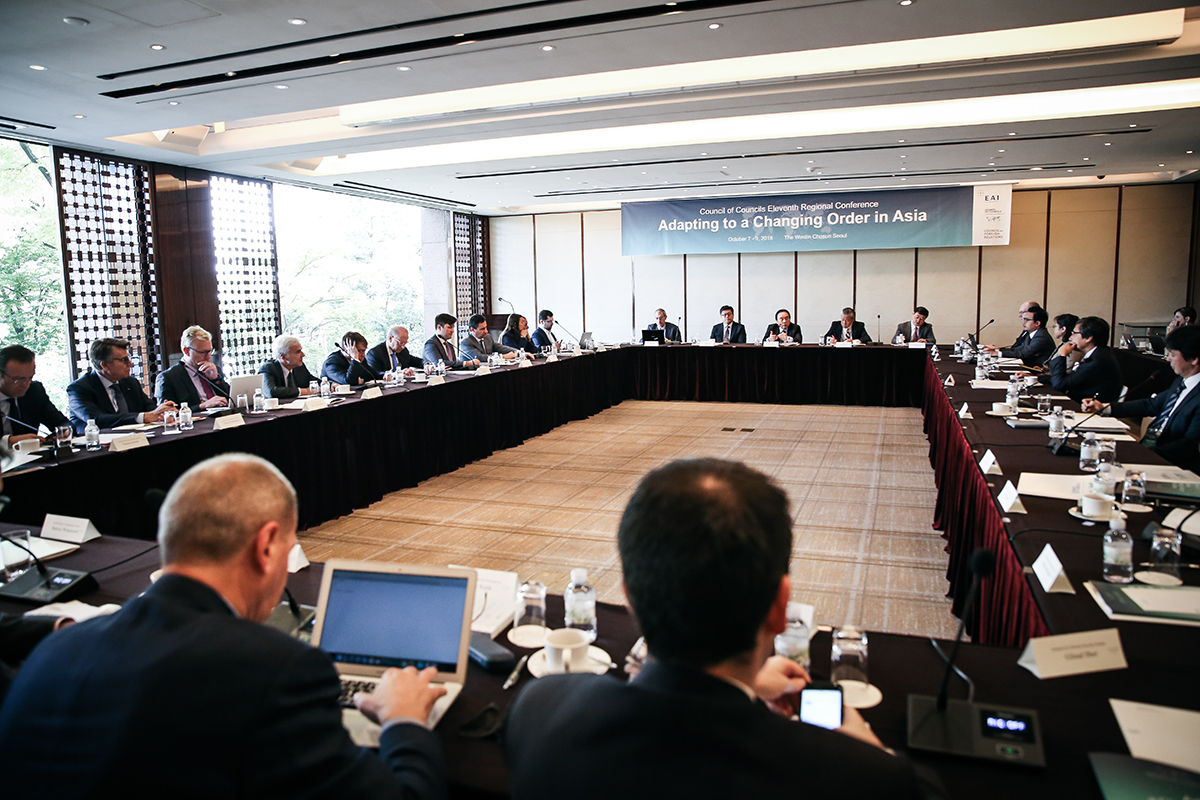
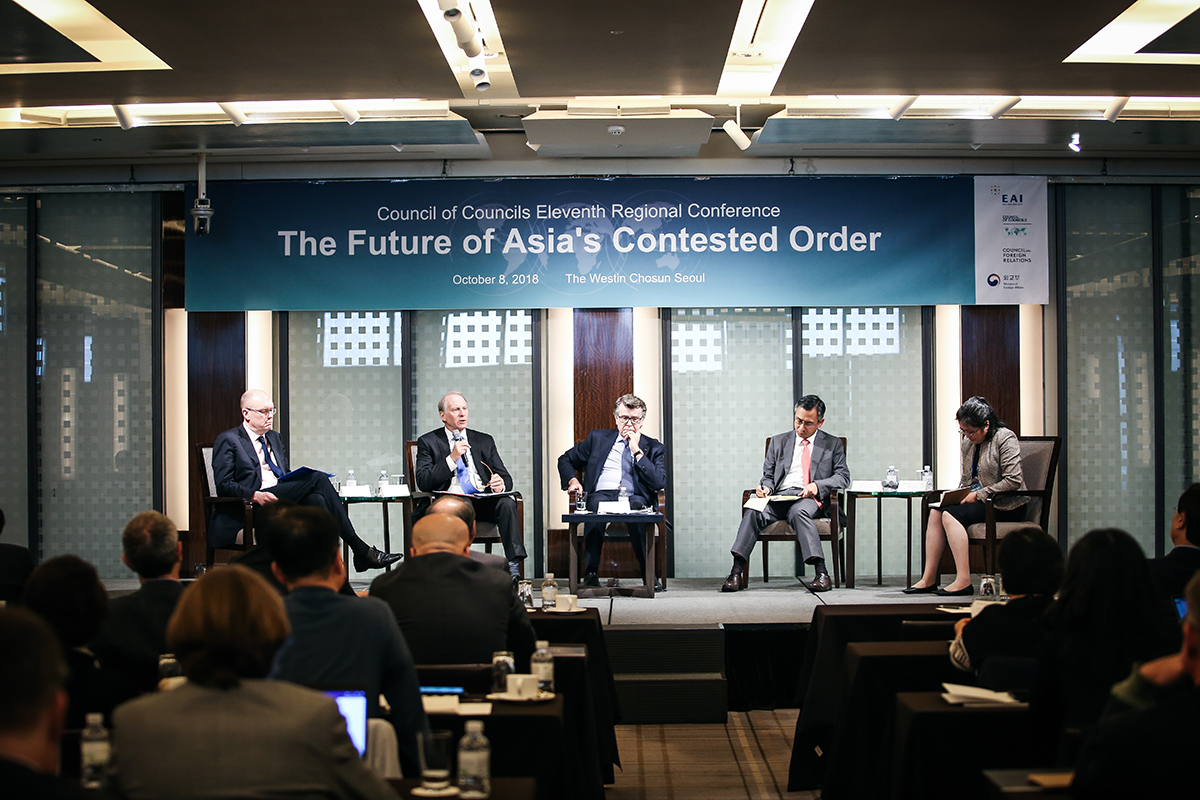
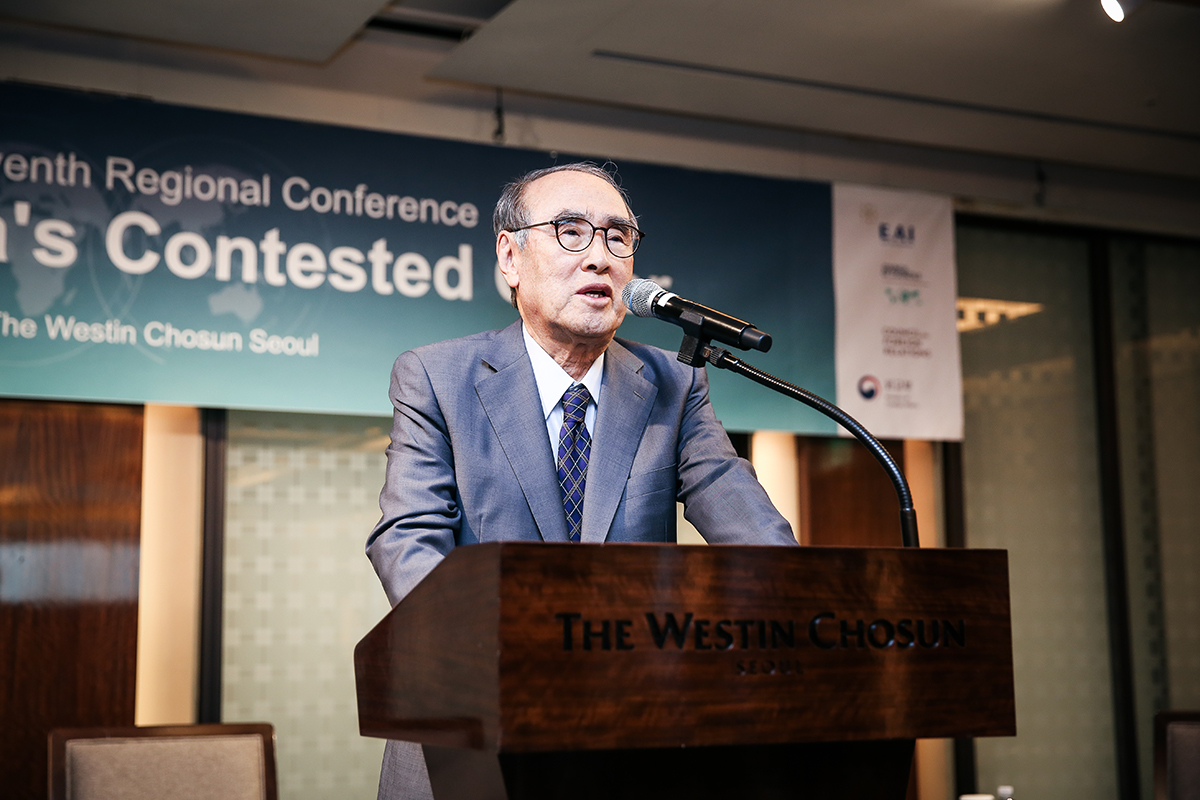
[제9기 EAI Academy] "미래세대를 위한 미래의 한국외교" 세미나
| 2018-10-07
"신흥기술로 재편되는 세계 안보 지형 속 청년과 군축" 군축비확산 청년 사절단 모집
| 2018-10-07